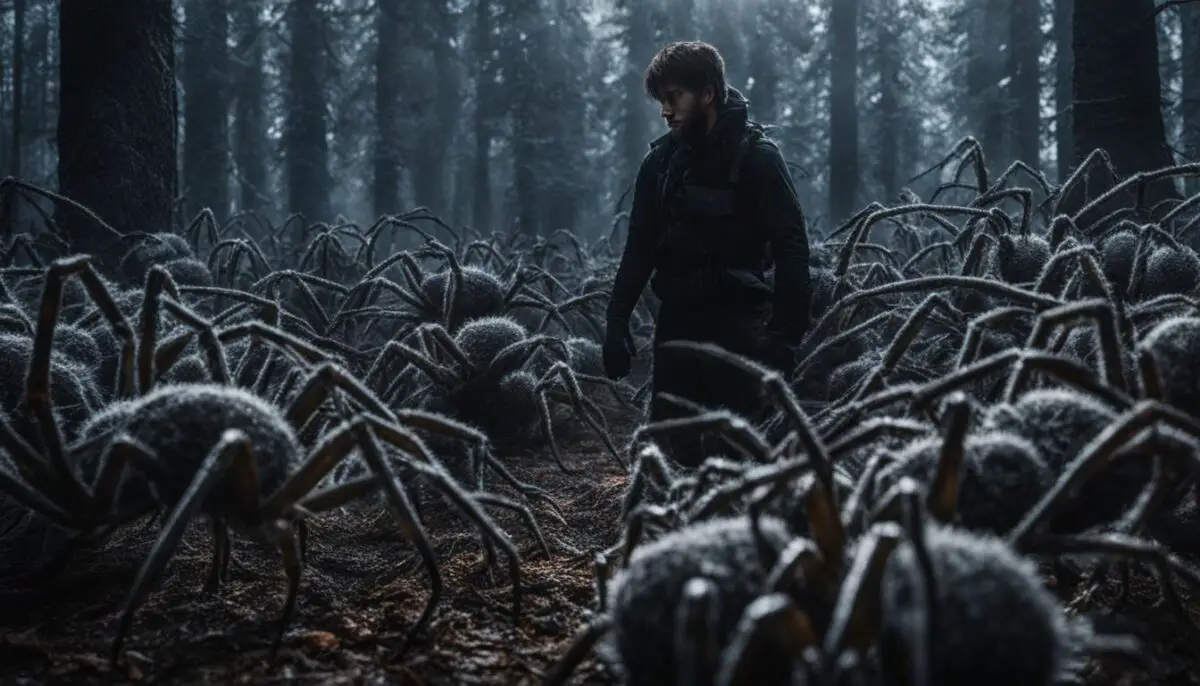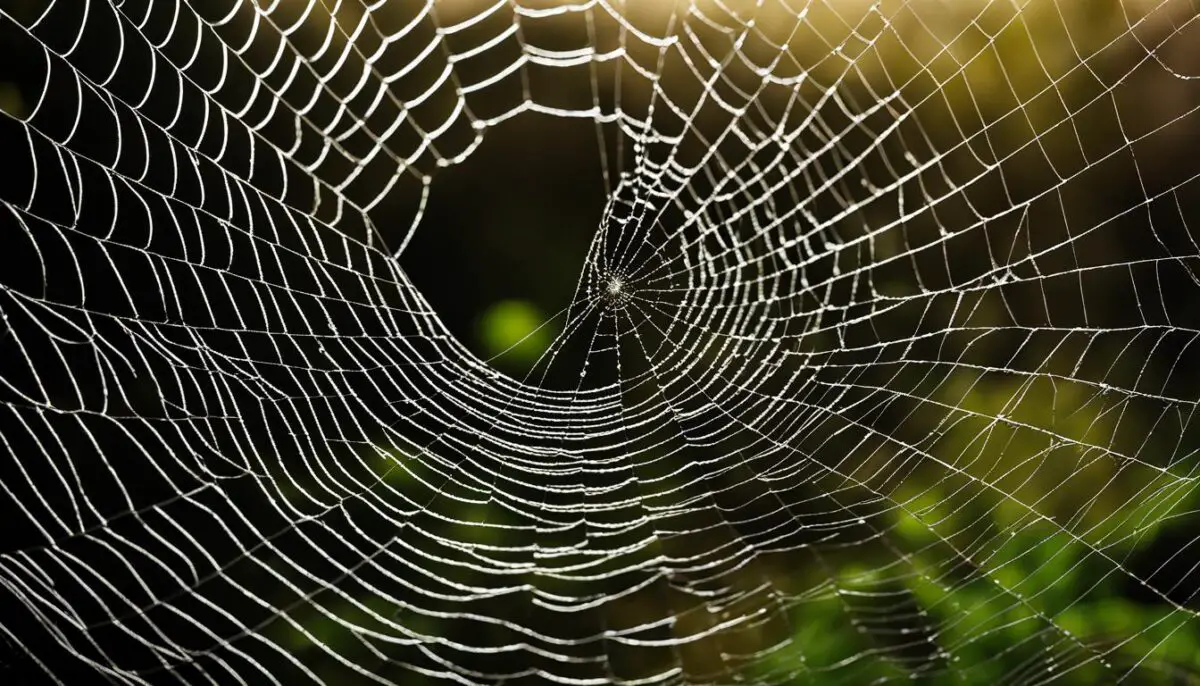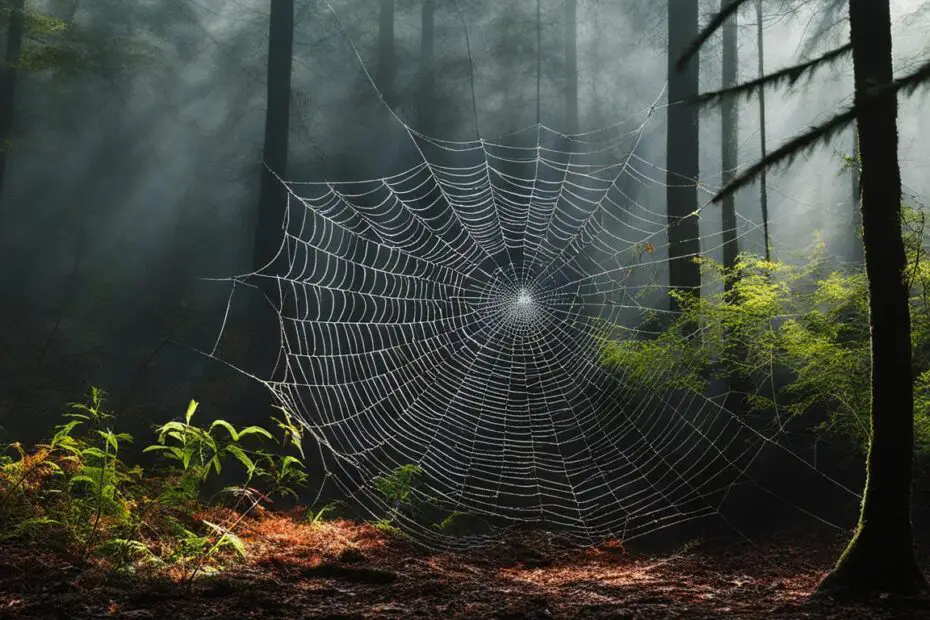Spiders, those eight-legged arachnids, have long fascinated and intrigued us. But have you ever wondered just how many spiders there are in the world? In this article, we will embark on a journey to uncover the secrets of the spider population and explore the estimated numbers and abundance of these fascinating creatures.
Through an in-depth exploration of factual data from various sources, we will shed light on the spider count, revealing the true magnitude of their presence on our planet. From the tiniest of house spiders to the vast diversity of species inhabiting diverse ecosystems, we will unravel the spider population size and delve into its sheer quantity.
Key Takeaways:
- The spider population worldwide is vast and diverse, with numerous species inhabiting various habitats.
- Factual data from various sources can provide insights into the estimated number of spiders on Earth.
- Understanding the spider count and population size helps us appreciate the incredible abundance of these arachnids.
- The number of spiders highlights their significant ecological role in maintaining balance within ecosystems.
- Appreciating the quantity of spiders can contribute to a better understanding and coexistence with these fascinating creatures.
How Much Spiders Are There
The Origins of the Myth: Swallowing Spiders in Sleep
For years, the myth of swallowing spiders in sleep has both intrigued and terrified people. This urban legend has become deeply ingrained in popular culture, fueling fears and perpetuating misconceptions about spiders. However, it is important to separate fact from fiction and understand the origins of this myth. how much spiders are there
The idea that spiders willingly crawl into our mouths while we sleep is purely fictional. Research and experts have consistently debunked this urban legend, stating that spiders have no interest in entering our oral cavities. The truth is, spiders are more interested in finding sheltered areas, such as cracks and crevices, where they can hide and hunt for prey.
So why does this myth persist? One reason is the power of storytelling and the allure of a creepy, spine-chilling tale. Urban legends like the spider-swallowing myth tap into our primal fears and captivate our imagination. They often provide a thrill and a sense of danger, even though they may be far from reality. types of spiders
It’s important to remember that myths and urban legends should be taken with a grain of salt. While they may make for interesting stories, they are not reflective of the actual behavior of spiders. Spiders play essential roles in ecosystems and are not interested in venturing into our sleeping mouths. By understanding the truth behind the myth, we can gain a more accurate and rational perspective on these fascinating creatures.
Debunking the Feasibility: Can Spiders Crawl into Our Mouths?
One of the most persistent myths surrounding spiders is the idea that they crawl into our mouths while we sleep. However, this notion is highly unlikely and lacks substantial evidence. Spiders have evolved to avoid potential dangers, and our involuntary reflexes, such as breathing and swallowing, act as powerful deterrents against these arachnids entering our mouths. spider statistics
Spider behavior plays a significant role in understanding why they are highly unlikely to crawl into our mouths. Spiders are generally reclusive and prefer to stay hidden in dark, undisturbed areas. They are sensitive to vibrations and movement, making them averse to approaching something as active as a sleeping human. Their instinctual behavior is to seek out places where they are less likely to encounter humans. While accidental encounters are possible, deliberate entry into our mouths is extremely rare.
Moreover, numerous studies and experts have emphasized that spiders do not view our mouths as inviting habitats. They are not attracted to human breath, nor do they see our mouths as a source of food or shelter. Spider physiology and behavior are not conducive to voluntarily entering our mouths, making the myth of swallowing spiders in sleep scientifically unfounded. spider abundance
Spider Deterrents
If you still have concerns about spiders crawling into your mouth while you sleep, there are several practical steps you can take to minimize the chances of such encounters. Keeping your sleeping area clean and clutter-free can reduce the likelihood of spiders taking up residence nearby. Regularly vacuuming and dusting can also help discourage spiders, as it removes potential hiding spots.
In addition, consider using spider deterrents such as natural spider repellents, like peppermint oil or vinegar, around your bed and sleeping area. These scents are known to repel spiders and may help create a spider-free zone. However, it’s important to note that no spider deterrent is foolproof, and occasional spider sightings are still possible.
| Spider Deterrent Methods | Effectiveness | Additional Information |
|---|---|---|
| Peppermint Oil | Moderate | Spiders dislike the strong scent of peppermint oil. Apply a few drops to cotton balls and place them strategically around your sleeping area. |
| Vinegar Solution | Mild | Mix equal parts water and vinegar and spray it in areas where spiders are likely to hide. |
| Sealing Cracks and Openings | High | Seal any cracks or openings in walls, windows, and doors to prevent spiders from entering your home. |
| Regular Cleaning | Moderate | Regularly clean your sleeping area to eliminate spider webs and potential hiding spots. |
By understanding spider behavior, utilizing spider deterrents, and maintaining a clean sleeping environment, you can significantly reduce the chances of spiders crawling into your mouth while you sleep. Remember, spiders are generally harmless creatures that play important roles in controlling insect populations. Developing a rational perspective and dispelling myths surrounding spiders will help foster coexistence and appreciation for these fascinating creatures. spider quantity
Fact-Checking the Myth: How Many Spiders Do People Swallow?
The claim that the average person swallows eight spiders in their sleep over a lifetime lacks substantial evidence. This infamous myth has been debunked by researchers and is not supported by factual data. Spiders are not attracted to human breath nor do they see our mouths as inviting habitats. Therefore, the notion that individuals consume a significant number of spiders during sleep is unfounded.
To shed light on the truth, let’s examine the spider-swallowing statistics. There have been no reliable studies or documented cases that provide evidence of spiders being ingested by humans during sleep. While it is possible for spiders to enter our sleeping spaces, they are highly unlikely to crawl into our mouths. Spiders prefer undisturbed areas and are more likely to stay hidden in dark corners rather than venturing into an open mouth.
Spider ingestion is an extremely rare occurrence, and the chances of swallowing even a single spider in a lifetime are minimal. It is important to base our understanding on scientific evidence and not perpetuate unfounded myths. By dispelling this long-standing myth, we can foster a more accurate and informed perception of spiders.

The Impact of Urban Myths on Spider Conservation
While urban myths may perpetuate fear and misconceptions about spiders, they also offer an opportunity to educate the public about these misunderstood creatures. By debunking myths and sharing accurate information, we can foster a greater understanding and appreciation for spiders and their role in ecosystems.
Spiders play a crucial ecological role as natural pest controllers, helping to regulate insect populations and maintain a balanced ecosystem. By dispelling myths and promoting spider conservation, we can encourage coexistence and protect these valuable creatures.
“The truth is, spiders are incredible creatures with remarkable adaptations. Understanding their behavior and dispelling myths can help us appreciate and respect their important role in the natural world.”
As we delve deeper into the fascinating world of spiders, it is essential to separate fact from fiction. By embracing scientific knowledge and dispelling urban myths, we can gain a more accurate understanding of these incredible arachnids and foster a harmonious relationship with the natural world.
Dispelling Misconceptions: Spiders and Human Interaction
There are many misconceptions surrounding spiders and their interactions with humans. It’s important to understand that spiders are generally harmless to humans and play a crucial role in controlling insect populations. Despite their creepy appearance, most spider species pose no danger to human health and are more beneficial than harmful. By dispelling these misconceptions, we can foster a greater appreciation for these fascinating creatures and promote coexistence.
Spider Safety: The fear of spiders, known as arachnophobia, is common among many individuals. However, it’s essential to recognize that the majority of spider species are harmless and prefer to avoid human contact. Spiders usually only bite humans if they feel threatened or cornered. Even in these cases, most spider bites result in minimal symptoms, similar to a mosquito bite. It’s crucial to remain calm and seek medical attention if you experience severe reactions or allergies to spider bites.
Spider Control: If you’re concerned about spiders entering your living spaces, there are several preventive measures you can take. Keeping your home clean and free of clutter reduces potential hiding places for spiders. Sealing cracks and gaps in windows, doors, and walls helps prevent spider entry. Additionally, using screens on windows and doors can create a barrier to keep spiders out while allowing fresh air to circulate. Natural deterrents such as citrus peels, vinegar, or essential oils with strong scents like peppermint can help repel spiders.
Spider Harm to Humans: The harmful impact of spiders on humans is often exaggerated. While some spider species possess venom, their venom is typically used to immobilize or kill their prey, not to harm humans. In the United States, there are only a few venomous spider species that pose potential health risks, such as the black widow and brown recluse. However, these spiders rarely bite humans, and fatalities from spider bites are extremely rare. It’s important to educate ourselves about these venomous species and take necessary precautions if we encounter them.
| Common Spider Species | Description |
|---|---|
| Black Widow (Latrodectus spp.) | Potentially venomous. Recognizable by their shiny black body with a red hourglass-shaped marking on the underside. |
| Brown Recluse (Loxosceles reclusa) | Potentially venomous. Identified by a violin-shaped marking on its back. |
| Common House Spider (Parasteatoda tepidariorum) | Non-venomous and harmless. Often found indoors, spinning messy webs in corners. |
| Wolf Spider (Lycosidae family) | Non-venomous and harmless. Known for their fast running speed and solitary hunting habits. |
By understanding the biology and behavior of spiders, we can coexist with them more peacefully. Remember, spiders provide valuable pest control by consuming insects that can be detrimental to our homes and gardens. By dispelling misconceptions and appreciating the role spiders play in the ecosystem, we can foster a greater respect for these remarkable creatures.

Conclusion
After delving into the fascinating world of spiders, it is clear that the myth of swallowing spiders in sleep is just that – a myth. Extensive research and expert analysis have debunked this urban legend, highlighting the unlikely scenario of spiders crawling into our mouths while we sleep.
By understanding spider behavior, habitat preferences, and communication methods, we can dispel misconceptions and gain a more rational perspective on these incredible creatures. Spiders are generally harmless to humans and play a vital role in our ecosystems, controlling insect populations and contributing to the balance of nature.
The complexity of spider web vibrations and their unique communication methods reveal the remarkable intelligence of these arachnids. Through vibrations, visual cues, and tactile interactions, spiders convey messages within their communities, engaging in courtship rituals and territorial disputes.
In conclusion, spiders are not to be feared or misunderstood. By appreciating their biological importance and respecting their natural habitats, we can coexist peacefully with these fascinating creatures. So let’s appreciate the role spiders play in our world and marvel at their intricate web of life.
FAQ
Are spiders really attracted to our mouths while we sleep?
No, spiders do not willingly enter our mouths while we sleep. Research and experts have debunked this myth, emphasizing that spiders are deterred by our involuntary reflexes, such as breathing and swallowing.
Is it true that the average person swallows eight spiders in their sleep over a lifetime?
No, this claim lacks substantial evidence. Researchers have debunked this myth and highlighted that spiders are not attracted to human breath or see our mouths as inviting habitats.
Do spiders crawl into our beds and mouths while we sleep?
It is highly unlikely. Spiders prefer to stay hidden in dark, undisturbed areas and are averse to approaching something as active as a sleeping human. Our involuntary movements, such as breathing and swallowing, act as powerful deterrents for spiders.
Are spiders harmful to humans?
Spiders are generally harmless to humans and play a crucial role in controlling insect populations. Common misconceptions about the harm spiders can cause often stem from urban myths and misunderstandings.
How do spiders communicate?
Spiders utilize vibrations as a primary means of communication. They create intricate patterns and frequencies through movements and web interactions to convey messages within their communities.
Why are we fascinated with spiders and their myths?
The fascination with spiders and their myths can be attributed to psychological reasons. We are often drawn to unsettling stories, and urban legends surrounding spiders spark our curiosity and imagination.

Мы служба SEO-специалистов, специализирующихся на продвижении сайтов в поисковых системах.
Мы гордимся своими успехами и предлагаем вам воспользоваться нашим опытом и знаниями.
Какие возможности открываются перед вами:
• [url=https://seo-prodvizhenie-ulyanovsk1.ru/]продвижение интернет сайтов цена[/url]
• Тщательный анализ вашего сайта и разработка персональной стратегии продвижения.
• Оптимизация контента и технических характеристик вашего сайта для достижения наивысших результатов.
• Систематический мониторинг и анализ результатов с целью улучшения вашего онлайн-присутствия.
Подробнее [url=https://seo-prodvizhenie-ulyanovsk1.ru/]https://seo-prodvizhenie-ulyanovsk1.ru/[/url]
Наши клиенты уже видят результаты: повышение посещаемости, улучшение позиций в поисковых запросах и, конечно же, рост бизнеса. Вы можете получить бесплатную консультацию у нас, для обсуждения ваших требований и разработки стратегии продвижения, соответствующей вашим целям и бюджету.
Не упустите возможность улучшить свои позиции в интернете. Свяжитесь с нами немедленно.
[url=https://isynthroid.com/]buy synthroid uk[/url]
[url=http://tadalafilstd.com/]how much is tadalafil 5mg[/url]
[url=http://azithromycinmds.online/]azithromycin tablets otc[/url]
[url=http://asynthroid.com/]synthroid discount[/url]